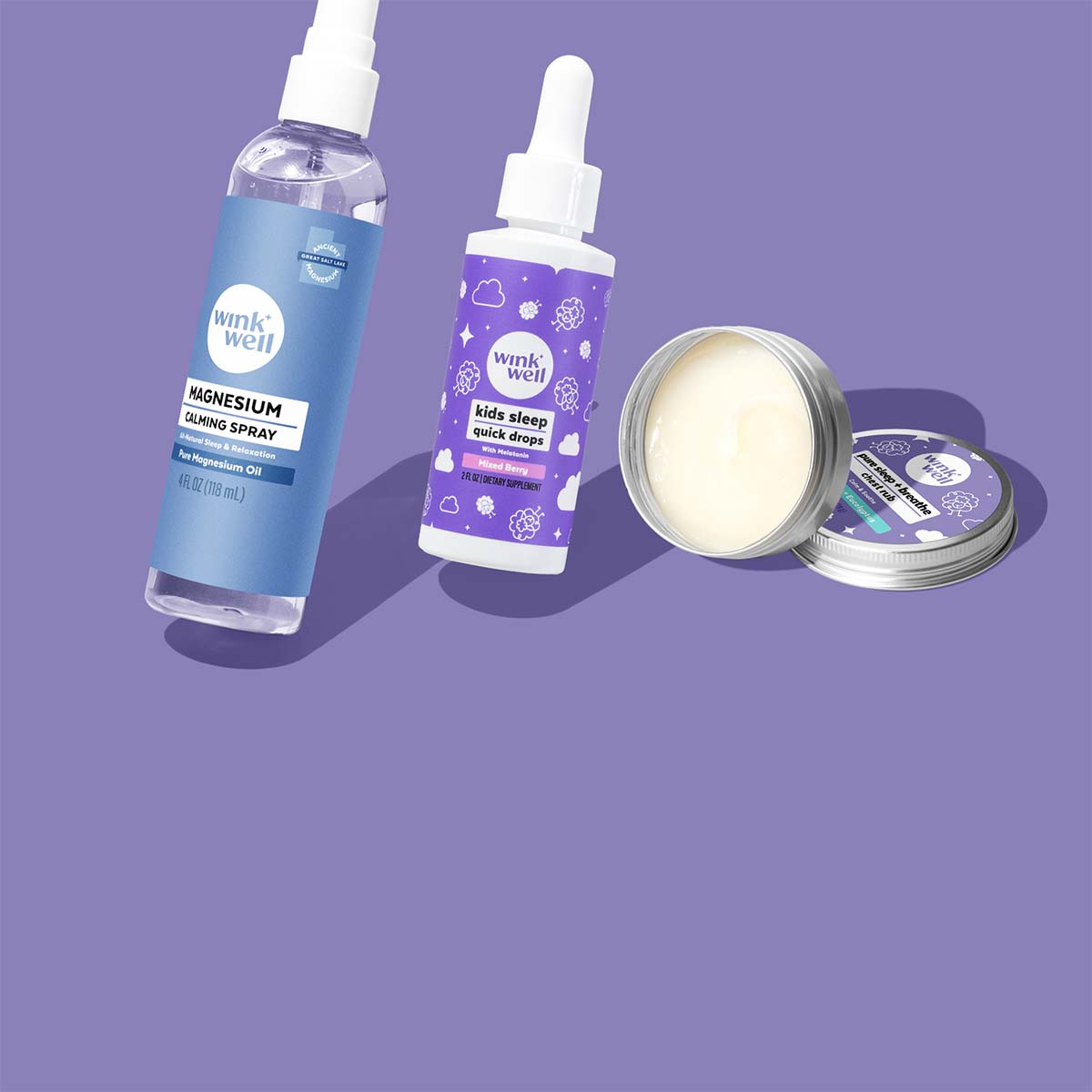Written by Chelsea Spooner,
Hi! Welcome to the “New Mom Guide.” This guide is a compilation of all the things we (mom’s and dad’s here at Wink) wished we would have known before starting the 4th trimester/postpartum stage. With so many changes on the horizon you may be feeling overwhelmed or anxious about the unknown. Don’t worry, we are here to dive into all sides of postpartum. We spared no expense with this guide! Our objective here is to tell you all the things no one ever told us. We hope this guide leaves you informed, reassured and ready to enter into this amazing journey.
Things That Happen To Your Body
Let’s jump right into the physical changes your body may go through once you get that beautiful baby earth side. Just know, they call it the miracle of life for a reason. Birth is a miracle!! Let's start by thanking our bodies for growing a tiny human (or humans) for nearly 10 months. (add more here)
Simple things can be painful.
Don’t worry if you are feeling pain doing all the simple things. Things that can be painful are sleeping on your stomach (due to engorgement in your breasts), nursing, sitting up in bed, rolling over, walking, doing stairs, etc. In the end, it is normal for all parts of recovery to feel difficult. Take it easy!
Hemorrhoids.
If you are unfamiliar with what hemorrhoids are here is a medical description. Hemorrhoids are, “swollen and inflamed veins in the rectum and anus that cause discomfort and bleeding. Hemorrhoids are usually caused from straining during bowel movements, pregnancy or giving birth.” These can also appear on the outside of the anus or the inside. The most common symptom is discomfort when trying to go to the bathroom or when sitting. Other symptoms include itching and bleeding. Hemorrhoids are also extremely common after pushing during birth. Since this topic might feel embarrassing, lots of us were never told how painful they can be OR how to help.
Tips on hemorrhoid control are:
- Take a Pre & Probiotic (to aid in digestion and promote regular bowel movements)
- Drink lots of water (this also helps with digestion and can prevent over straining)
- Use tucks pads to ease itching or discomfort
- Take a sitz bath (Soak your anal area in plain warm water for 10 to 15 minutes two to three times a day. A sitz bath fits over the toilet.)
- Add in high-fiber foods to your diet. Eating more foods like fruits, vegetables and whole grains helps to soften the stool which will help you avoid straining which can worsen hemorrhoids that you have.
Engorgement/milk coming in
All things milk and breastfeeding can be tricky. Your body creates milk but it doesn’t come in right away. For the first 2 to 5 days after your baby is born, you will make a small amount of colostrum and around day 3 through 5, your milk will come in. Keep in mind your breasts can increase two to three times in size during this time. It can be painful and there can be lots of leaking and sore nipples. There will be lots to figure out but just be patient and know it doesn’t last forever.
Expect Hair Loss
Postpartum hair loss is a hard stage. You might feel like you are losing hair by the handfuls and going bald. It is important to realize this isn’t true hair loss. A hormone called estrogen increases during the third trimester of your pregnancy which prevents your usual shedding of hair. As a result, you might feel like your hair is lush and full. After your baby is born that hormone, estrogen, drops drastically. This causes a large number of hairs to enter the resting phase of hair growth. After a few months (typically around 3-4 months pp) this hair starts to shed. Don’t worry too much as most moms see full growth and fullness by their child's 1st birthday. In the meantime, here are our 3 tips for navigating natural hair growth.
Tips:
- Keep taking your pre-natal up to one year postpartum
- Find a good multivitamin (hair, skin and nails)
- Use a collagen to help supplement your collagen levels.
Swelling and soreness
(down there-use correct anatomy term for what actually hurts here). There are several different things doctors may choose to do in order to get a baby here safely. One of those is called an episiotomy. An episiotomy is a cut in the area between the vagina and anus (perineum) during childbirth. The purpose of an episiotomy is to make the opening of the vagina a bit wider, allowing the baby to come through it more easily. If extra measures aren’t taken there can be natural tearing. Up to 9 in every 10 first time mothers who have a vaginal birth will experience some sort of tear, graze or episiotomy. Both recoveries take time. So with that being said, what happens after? Post-episiotomy swelling and recovery. Swelling after birth (down there) is NORMAL. You will recover and your body will heal. It can be scary and you might not even want to look but rest assured you will feel whole again. Something to note is, the longer you push, the more sore you'll be down there! You might also be more sore and swollen if you are a first time mom. This swelling can make it uncomfortable to even sit down. Along with swelling and soreness you might experience itching. If you have stitches from tearing or from getting an episiotomy those can create itchiness or discomfort.
Tips to combat swelling, soreness & itching.
- Use ice packs (provided by the hospital)(or a clay pack)
- Use Lidocaine Spray for gentle numbing pain relief
- Use tucks pads
Mental and Emotional Preparation
Imagine you have just given birth, they hand you a beautiful baby, stitch you up and go on their way. You are now responsible for this new little life and it feels like they didn’t give you much instruction. First things first, DO NOT be afraid to ask any and all questions. Don’t feel embarrassed or feel like you should know all the answers. Ask the questions!
Take it slow.
One minute you are in the hospital room soaking in those newborn snuggles and the next thing you know you’re tucking your two year old into bed at night. Our advice…take it slow, soak it in and know time is fleeting.
It takes time to feel whole again.
You have carried this baby for 10 months, you have given birth and changed as a person it is ok to not feel whole. You might feel completely different. You might be grieving your old self, body, life, etc and that is OK. It is ok to have a hard time in the newborn and postpartum stage, you can love your baby and not love the stage they are in. Realize it takes time to feel human again. Your body is different!! Rightfully so!! You grew a human and you grew as a human! Don’t compare yourself to anyone else. Your journey will look different. That is normal and ok. Your pre-pregnancy clothes will fit differently for a while (maybe forever!) and that is also ok. Get new clothes if you don't have any that fit. Also plan on wearing loose, comfortable clothes. It is smart to even keep some of those maternity clothes out a while longer to feel comfortable after birth. Don't worry about your "baby weight." Focus on staying hydrated and eating fruits, veggies, proteins daily to support your milk supply. Our advice is to get through the first 6 weeks. Those first 6 weeks may be the happiest, saddest, loneliest and most rewarding time of your life but once you make it past those 6 weeks your baby is getting past the “newborn stage” and you are getting out of the 4th trimester.
You might feel the lowest of lows and the highest of highs all in one minute.
Feeling lots of emotions is normal. However, there is a fine line between “normal emotions” and something more. Be sure to speak to your doctor or a mental health professional if you need additional support. Pay close attention to your mental health. Hormones are changing and your body is adjusting and it is OK to need help. Just know, you can put your baby down, even if they are crying. Make sure your baby is in a safe spot and walk away. Don't hesitate to reach out for help if you're feeling overwhelmed. Be sure to attend your 6 week postpartum visit as that is a great time to be evaluated for both mental and physical health. https://medlineplus.gov/lab-tests/postpartum-depression-screening/
Throw all expectations out the window.
The most important thing to note is, every baby is DIFFERENT. You might have heard that your cousin's baby never cried and started sleeping through the night at just two weeks old. That is great for your cousin, but you will (most likely) have a completely different experience. Babies cry… a lot! Some more than others but in the end crying is normal and it is a way for those babies to express themselves.
Don’t be afraid to say no!
Regardless of the time of year your baby is born it is important to keep them away from people that are sick. Do not be afraid to say “no, you cannot hold my baby right now”. You might feel nervous about speaking up and hurting their feelings but in the end you are in charge and people will understand. It is important to keep your baby safe! Keep hand sanitizer accessible wherever the baby goes! People will ask to hold your baby, so spritz their hands first, if you want to let them hold it. It is a good idea to set boundaries with visitors and the baby so you feel confident.
Feeding baby
Fed is best!
Breastfeeding, bottle feeding, formula, pumping half and half etc. Whatever you decide, remember fed is best. Some people love breastfeeding and the bond and connection it brings and others feel stressed and overwhelmed. In the end, your mental health is very important and making sure you are doing what is best for you is ESSENTIAL. Studies show there's no real difference in kids who are breastfed vs formula fed once they’re school-aged. Even if you're planning to exclusively breastfeed, get a pump and a few milk bags. The pump will most often be provided to you by your health insurance. Having a pump is helpful when it comes to leaving the baby, easing engorged breasts and more.
Stretches
Lets just say being in the same position over and over, whether that is for breastfeeding or holding your baby while they eat or sleep, your body can start to feel the negative effects. A great way to combat that is to get moving! Stretching is a great way to move while still staying inside the guidelines recommended for movement postpartum. https://www.sweatyasamother.com/blog/10stretchestoeasebackshoulderneckpain
Have a dimmable night light
for late night feedings. This is a great way for you and your baby to stay calm and relaxed during those night feedings. Turning on the light and making a big ordeal each time you wake to feed could make it harder for everyone to settle back down.
Make your postpartum nutrition a priority
Breast Milk is more than 80% water. This makes it super important for mom to be hydrated. You will most likely be chugging the water and having a good water bottle makes it easier and fun. Not only will water help your milk supply but it can also help with bowel movements, complexion and more. You should also prioritize your diet. A well rounded diet with fruits, veggies, healthy fats, protein etc will contribute to your milk supply.Pro Tip: Help increase your water intake by adding Boost + Vitamin C. This is a great way to add flavor to your water while also adding essential vitamins and minerals to your diet.
Prepare yourself to be entertained
You'll be spending A LOT of time just chilling while you feed the baby. It has been estimated that a mother spends about 1800 hours a year breastfeeding. To quantify that, it isn't far off from a full time job considering that a 40-hour work week with three weeks of vacation comes in at 1,960 hours of work time a year. So with that being said, pick out some shows, books, podcasts or your preferred entertainment ahead of time so you don't just stare at your phone and scroll social media sites! (Unless that's what you're wanting to do. Go ahead). The same is true if you decide to pump and bottle feed or use formula.
Preparing yourself and your house.
Spend time or have someone else spend time preparing your house.
Having your house cleaned, organized, and decluttered BEFORE baby comes helps A LOT. It allows you to come home to an organized space that feels clean and inviting for you and your new baby.
When in doubt, keep it simple with your preparations
Know what you're interested in, but wait until you think you need it to actually buy it! DO NOT spend all of your money and time on baby clothes. They go through them so fast, and sometimes skip sizes! It's great to be prepared and ready with what you think you'll need, but don't go overboard. Pro Tip: Buy diapers gradually over time in various sizes before the baby comes to spread out the costs. Babies can require up to 10-15 diaper changes per day at first.
Have PP supplies set up in your bathrooms (plural if you will be using multiple)
Try to imagine how you're going to live for the first few months with a baby! Will you mainly be in your room? In the family room on the couch? You will be spending some time in the bathroom for the first few weeks at least. Have a transportable caddy with everything you might need in those quality time spaces. Diapers, thermometers, bum balm, lotion, nosefrida, clippers, extra outfit, socks and gloves, pacifiers, all of it. That way you (or your partner) isn't having to run all over the house every hour or so.
Time management
Mentally prepare for the extra time you will need when your baby is here. You will have lots of doctor visits those first few months. Plan to leave the house 20 minutes early, always. Chances are, you'll need that extra 20 with the baby in tow.
Join a parenting page
When you are in the trenches of motherhood it can be comforting to know you are not alone. Find a wholesome and uplifting parenting page that can be a resource and a comfort during this time. It can be helpful to connect with other moms in the same stage of life. A local mom group can provide support, advice, and friendship. Make sure you join a group that is uplifting, helpful and beneficial to you. Avoid negative talk, drama and bad vibes!
Still have questions? Let us know!







Leave a comment
All comments are moderated before being published.
This site is protected by hCaptcha and the hCaptcha Privacy Policy and Terms of Service apply.